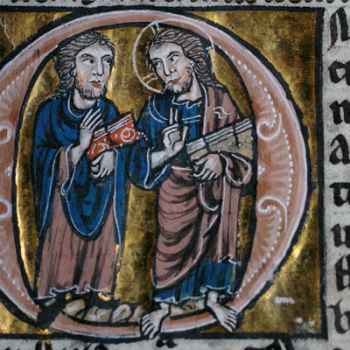
When Jesus’ disciples complained about the way he had been anointed by a woman with expensive ointment, Jesus said that the woman who had done so had done a good thing. “For you always have the poor with you, but you will not always have me “(Matt. 26:11 RSV). Jesus, of course, was talking about the way he was being prepared for death, and the woman had done a good thing because it was as if she had prepared his body for burial. Jesus would not always be going towards his death; it was a one time event in history. Therefore, not everyone will have him in this fashion. This is why we must not take his words in the wrong way and think they contradicted what he said after his resurrection when he sent his disciples out, saying to them,“Go therefore and make disciples of all nations, baptizing them in the name of the Father and of the Son and of the Holy Spirit, teaching them to observe all that I have commanded you; and lo, I am with you always, to the close of the age” (Matt. 20:19-20 RSV). Jesus’s words must be interpreted properly. To use them as an excuse to ignore the plight of the poor is to abuse them. Jesus never wanted us to ignore the poor and their needs. This is why he indicated that what we do for the poor we are do for him, and in this fashion, we find his presence in and with the poor (cf. Matt. 25:31- 46). If we want to meet Jesus, if we want to see how he is with us to the end of the age, we can do this by going out to the poor who we have with us, as St. Photius the Great preached:
Let us go forth to meet Him spreading out our garments. How are we to spread them out? By spreading them under the poor; for He takes upon Himself the plight of the poor, and cries out: “Inasmuch as you have done it unto one of these my brethren, you have done it unto me.” Oh, what merciful and divine words! You are spreading out your garments under my feet, He says, when you clothe the poor; you are cheering me when you release them from the bitter sting of the cold. [1]
Jesus, as Pope Francis explains in his Message for the Fifth World Day For The Poor, shares his lot with the poor; if we love him, we will then look to the poor which is with us and comfort them and take care of them and lift them up:
Jesus not only sides with the poor; he also shares their lot. This is a powerful lesson for his disciples in every age. This is the meaning of his observation that “the poor you will always have with you”. The poor will always be with us, yet that should not make us indifferent, but summon us instead to a mutual sharing of life that does not allow proxies. The poor are not people “outside” our communities, but brothers and sisters whose sufferings we should share, in an effort to alleviate their difficulties and marginalization, restore their lost dignity and ensure their necessary social inclusion. [2]
When the poor are in need, Christ is in need. When the poor are abused, Christ is abuse. When the poor are told they are to blame for their own miseries and should not get any help because of it, Christ is told he is at fault and should expect nothing from us. The poor is always with us, and in and with them, we have Christ. Why, then, do so many Christians abuse the poor and needy, and treat them with contempt? Why do they work for and support those who are already rich and wealthy, looking after their interests more than those who are truly in need? St. Salvian wondered about this:
You who say you are Christian, when you see that Christ is in need, do you leave your wealth to those who are not in need? Christ is poor, and do you further increase the wealth of the rich? Christ is hungry, and do you prepare delicacies for those who are surfeited? Christ complains that He even lacks water, and do you fill the storehouses of the drunken with wine? Christ is weakened by the want of everything, and do you gather an abundance for those who are in luxury? Christ promised you eternal rewards for the gifts given by you, and do you bestow everything on those who will give you nothing? [3]
Indeed, it was with this understanding that St. John Chrysostom reminded us, if all we want to do is look after ourselves and our own interests, we would better off if we helped Christ in the poor than to take care of and protect the so-called rich, because Christ has so much more to give us in return:
Surely, you must not think of giving alms to the poor as an expense but as a source of income. It is not an outlay of money but it is a profitable business. For you get back more than you give. You give bread and get back eternal life. You give a coat and get back a garment of immortality. You give your house to be shared and you get back a heavenly kingdom. You offer perishable things and you receive things which last forever.[4]
This is not to say we should be mercenary in our love; we should do good because it is good; we should love what is good because it is good. Doing what is good should be its own reward. But we must realize not all of us are as selfless as we should be. Most of us act with imperfect, indeed, selfish motives. This is why, when talking about what should be done, we find various indications of what is in it for those who do good; this helps encourage people to do what is right, to get on the path which takes them to doing what is good and right. If they follow that path all the way to the end, they will be transformed by it; they will slowly find themselves giving up all their selfish concerns; they will die to the self and become selfless like Christ. And yet, it will be at that stage, once they have cast off the self they will find their greatest reward, which is full union with God; it cannot be had when they are still attached to the self, for the self will get in the way of such union. When the self has been crucified, they will become open vessels of love and grace, sharing all they have with others without concern for themselves.
Thus, Christ is to be found in and with the poor. The poor will always be with us unto the end of the age, and so we will find Christ in them unto the end of the age. Through the revelation of Jesus Christ, we are shown the care and concern God has for them, for all who are poor and needy. If we want to embrace the revelation given to us in and through the incarnation, we will therefore turn to the poor:
The face of God revealed by Jesus is that of a Father concerned for and close to the poor. In everything, Jesus teaches that poverty is not the result of fate, but a concrete sign pointing to his presence among us. We do not find him when and where we want, but see him in the lives of the poor, in their sufferings and needs, in the often inhuman conditions in which they are forced to live. As I never tire of repeating, the poor are true evangelizers, for they were the first to be evangelized and called to share in the Lord’s joy and his kingdom (cf. Mt 5:3).[5]
St. Vincent de Paul understood this, which is why he said our inheritance is with the poor:
My confreres, our inheritance is the poor, the poor; pauperibus evangelizare misit me. What happiness, gentlemen, what happiness! To do that for which our Lord came from heaven to earth, and by means of which we too shall go from earth to heaven, to continue the work of God, who shunned cities and went to the countryside to seek the poor. [6]
If we want to be co-heirs with Christ, we will act as Christ acts, do what Christ does, and find ourselves and our lot intricately linked with the poor. It might not be easy, but it is in and through this we will find mercy and grace:
Love the poor, that through them you may also find mercy. Do not keep company with the disputatious, lest you be forced to take leave of your calm. Bear the noisome smells of the sick without disgust, and especially of the poor. Since you too are wrapped about with a body. Do not rebuke those who are afflicted in heart, lest you be scourged with the selfsame rod as theirs: then you will seek consolation and find none. [7]
When we can truly suffer with the poor instead of merely look down upon them with derision, we will find grace is taking effect in us, that the transformation which we need in order to be co-heirs with Christ has begun. It is not easy. Many of us will find the transformation will take far longer than our temporal existence as we must work out all the selfish aspects in us which get in the way. Nonetheless, if we understand this, if we fight and struggle against our worst inclinations, we will find grace will indeed perfect nature and in the eschaton we will truly find ourselves one with Christ in and with the poor. Indeed, we will find ourselves one with the poor so as to receive all that the poor receives in Christ.
[1] St. Photius, The Homilies of Photius, Patriarch of Constantinople. Trans. Cyril Mango (Harvard: Harvard University Press, 1958; repr. Eugene, OR: Wipf & Stock, 2017), 159 [Homily VIII].
[2] Pope Francis, “Message for the Fifth World Day For the Poor: Nov. 14, 2021” (6-13-2021). Vatican translation. ¶3.
[3] Salvian the Presbyter, “The Four Books of Timothy to the Church” in The Writings of Salvian the Presbyter. Trans. Jeremiah F. O’Sullivan (Washington, DC: CUA Press, 1962), 361-2.
[4] St. John Chrysostom, On the Incomprehensible Nature of God. Trans. Paul W. Harkins (Washington, DC: CUA Press, 1982), 216-17 [Homily 8].
[5] Pope Francis, “Message for the Fifth World Day For the Poor: Nov. 14, 2021,” ¶2.
[6] St. Vincent de Paul, “Conference, 17 May 1658” in Vincent de Paul and Louise de Marillac: Rules, Conferences, and Writings. trans. Hugh F. O’Donnell, Frances Ryan, Louise Sullivan, Vie Thorgren and Edward R Udovic (New York: Paulist Press, 1995), 128.
[7] Saint Isaac the Syrian, The Ascetical Homilies of Saint Isaac the Syrian. Trans. Monks of the Holy Transfiguration Monastery. Rev. 2nd ed (Boston, MA: Holy Transfiguration Monastery, 2011), 167 [Homily 5].
Stay in touch! Like A Little Bit of Nothing on Facebook.
If you liked what you read, please consider sharing it with your friends and family!













